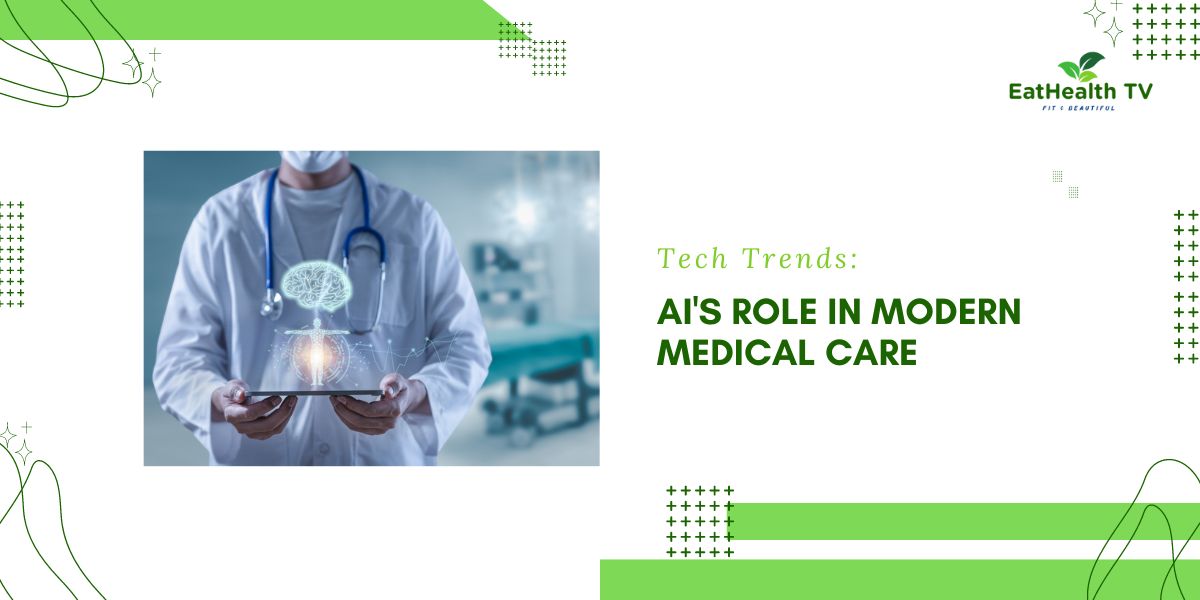Tech Trends: AI’s Role in Modern Medical Care
Revolutionizing Healthcare: The AI Evolution

AI in Healthcare: Transforming Patient Care
In today’s rapidly advancing world, technology is transforming every aspect of our lives, including healthcare. Among the most groundbreaking technological innovations is artificial intelligence (AI), which is revolutionizing the landscape of modern medical care. From diagnosis to treatment and beyond, AI is playing an increasingly vital role in improving patient outcomes, enhancing efficiency, and driving innovation in healthcare delivery. In this comprehensive guide, we will explore the various ways in which AI is reshaping modern medical care, from diagnostic algorithms to robotic surgery and beyond. Whether you’re a healthcare professional, a student, or simply curious about the latest tech trends in medicine, this article will provide valuable insights into the transformative power of AI in healthcare.
Understanding AI in Healthcare
- What is Artificial Intelligence?: Artificial intelligence refers to the simulation of human intelligence by computer systems, enabling them to perform tasks that typically require human intelligence, such as learning, problem-solving, and decision-making. In healthcare, AI algorithms analyze vast amounts of medical data to identify patterns, make predictions, and assist healthcare providers in clinical decision-making.
- Types of AI in Healthcare: There are several types of AI applications in healthcare, including machine learning, natural language processing, computer vision, and robotics. Machine learning algorithms, in particular, are widely used in healthcare for tasks such as diagnostic imaging, predictive analytics, and personalized treatment planning.
Applications of AI in Modern Medical Care
- Diagnostic Imaging: AI algorithms are being used to analyze medical images, such as X-rays, CT scans, and MRI scans, to assist radiologists and other healthcare providers in detecting abnormalities, diagnosing diseases, and planning treatments. By analyzing images with greater speed and accuracy than humans, AI can help improve diagnostic accuracy and reduce interpretation errors.
- Clinical Decision Support: AI-powered clinical decision support systems provide healthcare providers with evidence-based recommendations and treatment guidelines based on patient data and medical literature. These systems can help improve clinical outcomes, reduce medical errors, and enhance patient safety by providing timely and relevant information to healthcare providers at the point of care.
- Robotic Surgery: Robotic surgery systems, such as the da Vinci Surgical System, use AI algorithms to assist surgeons in performing minimally invasive surgical procedures with greater precision and control. These systems enable surgeons to operate with enhanced dexterity and visualization, resulting in shorter recovery times, reduced post-operative pain, and improved surgical outcomes.
- Healthcare Administration: AI is also being used to streamline administrative processes in healthcare, such as patient scheduling, billing, and medical coding. AI-powered tools can automate repetitive tasks, improve workflow efficiency, and reduce administrative burdens on healthcare staff, allowing them to focus more time and resources on patient care. Just as we know How Human Physiology Shapes Medications: Dosages, Effects, and Safety
Benefits and Challenges
- Benefits of AI in Healthcare: AI offers numerous benefits for patients, healthcare providers, and healthcare systems, including improved diagnostic accuracy, personalized treatment planning, enhanced patient outcomes, increased efficiency, and cost savings. By harnessing the power of AI, healthcare organizations can deliver higher quality care, improve patient satisfaction, and drive innovation in medical research and practice.
- Challenges and Considerations: Despite its potential benefits, AI in healthcare also poses several challenges and considerations, including data privacy and security risks, regulatory and ethical concerns, algorithm bias, interoperability issues, and workforce displacement. It’s essential for healthcare organizations to address these challenges and considerations proactively to ensure the responsible and ethical use of AI in healthcare.
Future Directions and Opportunities
- Precision Medicine: AI has the potential to revolutionize precision medicine by analyzing large datasets of patient information to identify biomarkers, genetic factors, and other factors that influence disease risk and treatment response. By tailoring treatments to individual patients’ unique characteristics and medical histories, precision medicine holds promise for improving patient outcomes and reducing healthcare costs.
- Remote Patient Monitoring: AI-powered remote patient monitoring devices can collect and analyze real-time data on patients’ vital signs, symptoms, and behaviors, allowing healthcare providers to monitor patients’ health status and intervene early when necessary. Remote patient monitoring can help improve chronic disease management, reduce hospital readmissions, and enhance patient engagement and self-management.
- Drug Discovery and Development: AI algorithms are being used to accelerate the drug discovery and development process by analyzing large datasets of biological and chemical data to identify potential drug targets, predict drug efficacy and safety, and optimize drug formulations. AI-powered drug discovery platforms have the potential to revolutionize the pharmaceutical industry and bring new treatments to market more quickly and cost-effectively.
Conclusion
In conclusion, AI is transforming modern medical care in profound and unprecedented ways, from diagnostic imaging to robotic surgery and beyond. By harnessing the power of AI in healthcare organizations can improve patient outcomes, enhance efficiency, and drive innovation in healthcare delivery. However, realizing the full potential of AI in healthcare requires careful consideration of the benefits, challenges, and ethical considerations involved. By working together to address these issues, we can harness the transformative power of AI to create a brighter and healthier future for all.




